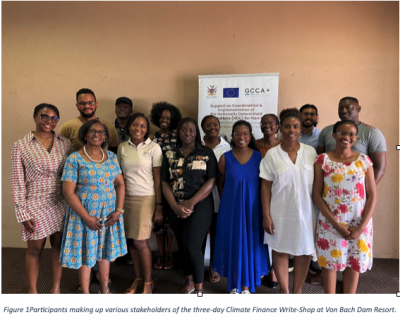
Climate Finance Partners Host Write-Shop
The Deutsche Gesellschaft für Internationale Zusammenarbeit GmbH (GIZ) has provided the Environmental Investment Fund (EIF) with financial assistance to conduct capacity building workshops for Namibian stakeholders.
The Ministry of Environment Forestry and Tourism, with technical assistance from the Commonwealth Climate Finance Access Hub, is collaborating with the EIF to operationalize this capacity building support, having scheduled four training sessions for 2022. The first session was concluded on 15 and 16 March 2022, supported by the African Development Bank (Africa Climate Change Fund) with climate finance capacity building through this two-day training workshop. This was attended by participants from public, private, academia and civil society organizations. Orientation to key elements of funding proposals and generation of initial project ideas made up the agenda for the second session which was held on 12 and 13 July 2022. Session three, currently underway at Von Bach Dam Resort, situated 3.5km from Okahandja, from 12 – 14 October 2022, will see stakeholders review project ideas, develop Green Climate Fund (GCF) concept notes, and develop Project Information Notes (PINs).
Namibia submitted its updated Nationally Determined Contribution (NDC) to the UNFCCC in 2021 and set out several actions and targets that will reduce emissions across key sectors including energy, transport, industry, forestry, and other land uses as well as build resilience in agriculture, water, infrastructure, ecosystems, and livelihoods to adapt to the unavoidable impacts of climate change. The estimated investment required for the remainder of the NDC period (2021–2030) is approximately USD5.3 billion of which 10% is unconditional. This requires a considerable scaling up of resources, particularly from developed countries and the private sector.
The climate finance landscape in Namibia highlights that scaling up climate finance to meet the goals set out in Namibia’s NDC will require a concerted effort by all stakeholders. To realize this, Namibia needs to strategically position itself to create an investment climate conducive to private climate investment, and to use public funds to catalyse private investment.
According to the write-shop facilitator, Ms. Bernadette Shalumbu, Manager Programmes and Programming at the EIF highlighted that the objective of the training workshops is to accelerate the implementation of the NDC targets through development of project concepts/proposals by a core team of stakeholders consisting of state and non-state actors. “The session will culminate into five zero drafts of project concept notes and two Project Idea Notes (PINs) targeting a range of public and/or private sources of finance for priority sectors in Namibia “she said. She further noted that having conducted two training workshops earlier in the year, to direct the knowledge acquired by conducting a write-shop that will produce two tangible outputs. “We further wish to see increased access to climate finance, enhanced capacity of institutions in identifying and accessing climate finance and to enhance private sector engagement in financing local climate actions and intertest to blend financing with public resources, Shalumbu stated.
Other expected outcomes for the write-shop are:
- Understanding the role of partnerships in accessing international climate finance
- Understanding sector needs
- Understanding localised funding
- Aligning the proposal to the GCF investment criteria and using the criteria to prioritize project ideas
- Overview of climate finance needs and flows in Namibia
- Understanding other tools for climate finance mobilization
Alfeus Shekunyenge, Technical Advisor for the Climate Change and Inclusive Use of Natural Resources (CCIU), project funded by GIZ, co -funded by the European Union, says that as a supporting entity of this write-shop, this climate finance training is very important not only to the project, but to the country at large. Namibia is among the countries with the most ambitious NDC’s with a lot of ambitious climate activities for the mitigation and adaptation. He says, “bringing the stakeholders together for this climate finance training is very important because the Namibian government alone will not be able to implement all the NDC targets and mobilize the much-needed resources on their own. The government will need to collaborate with the private sector, local universities, and the NGOs in the areas of capacity building and bankable project proposal development. that can be submitted to various multilateral financing windows.” Shekunyenge also added that the write-shop is an initiative geared towards bringing the stakeholders onboard to meet the government of the republic of Namibia halfway and to achieve a net-zero emission target.
This write–shop was conducted in a suite of approaches involving short presentations and practical group work. Participating stakeholders included, Bank Windhoek, Namibia Energy Institute -NUST, Rossing Foundation, Development Bank of Namibia (DBN), Agricultural Bank of Namibia, University of Namibia (UNAM), International University of Management (IUM) , MURD, NamPower, Namibia Nature Foundation (NNF), Office of the Prime Minster (OPM) , Environmental Investment Fund of Namibia (EIF), Commonwealth , Ministry of Environment Forestry and Tourism (MEFT) and Deutsche Gesellschaft für Internationale Zusammenarbeit GmbH (GIZ). Joining the training virtually, were CNCFA Mauritius, CNCFA Zambia, SADC Secretariat, NDC PSU, and CCFAH.
The last session which date is yet to be determined will allow for in-depth orientation to the work on the Nationally Determined Contribution (NDC) and accredited entities for the core team of project developers.




